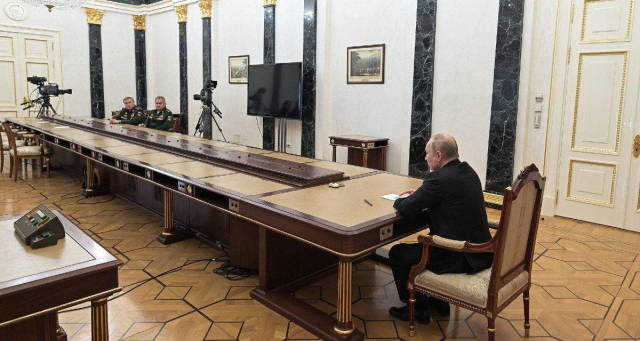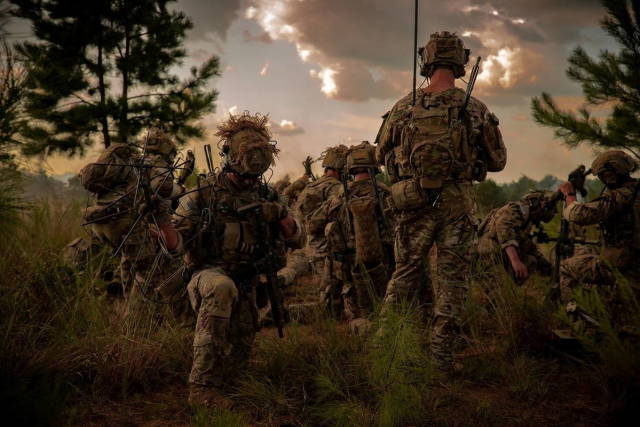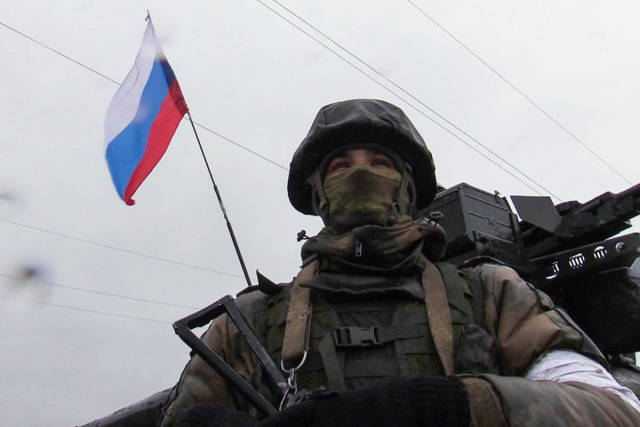Russia's special operation to protect the Donetsk and Lugansk People's Republics will certainly take its place in the world history of military art. The editorial board of IVi plans to publish materials related to the current events and reflecting the views and opinions of foreign military experts about them. In this publication, we offer readers an article by Dr. Jacob STOYLE, an employee of the Institute of Modern War at West Point (USA), "Seven strategic lessons from the first days of the war in Ukraine" (Seven strategic lesson from the firsr days oft he war in Ukraine).
As before, the translation was made with the preservation of the terminology and style of the author. The changes made are due to the requirements of search engine optimization (SEO). [Additions from IVi are given in square brackets]

Dr. Jacob STALL
Author: Dr. Jacob Stoil is a military historian and researcher at the Institute of Modern Warfare at West Point, as well as an adjunct professor of military history at the US Army School of Advanced Military Studies. He has published on a wide range of topics, including Israel's military history, urban and underground wars, and World War II. J. Stoyle holds a PhD from Oxford, as well as a master's degree from the Faculty of Military Studies at King's College London.
At the time of publication of this article, about a hundred hours had passed since the beginning of Russia's special operation [the author's invasion of Ukraine]. Countless groups are being formed in the US Armed Forces, as well as among our partners and allies around the world, to study the tactical and operational lessons of this recent act of Russian aggression. These teams will focus on how Russia is waging war using conventional weapons, its new tactics, its operational approaches and how it integrates its weapons. These lessons will take time to develop. Meanwhile, there are seven lessons that the US military can learn from preparing for the Russian invasion and the first day of the war. Regardless of the final result, these lessons will remain relevant.
Lesson 1. The logic of nuclear deterrence and guaranteed mutual destruction has not changed
Throughout the Cold War, the threat of nuclear war kept the nuclear Powers from participating directly. Indeed, a clear display of sufficient armed determination on the whole was enough to prevent an escalation on the part of another Power. It is difficult to imagine any limited goal set before a nuclear war. This led to a cautious deployment. American troops did not defend Hungary in 1956, and Soviet troops did not use their advantage in the Berlin area. Both sides usually accompanied their troop movements and forward deployments with significant escalation control measures.
The deployment of US forces in Eastern Europe over the past few months continues to reflect this logic. As Russia became increasingly belligerent towards Ukraine, the United States cautiously sent its forces to NATO countries. These countries could hardly have been subjected to aggression by the conventional Armed Forces of Russia, at least in this round of the conflict. This invariably prevailing logic also means that a great-power adversary is unlikely to attract any active U.S. deployment by large-scale conventional means.
At the same time, this does not make wars less likely due to what became known as the stability-instability paradox among deterrence specialists during the Cold War. The logic of this paradox did not disappear with the collapse of the Soviet Union. At its core, this paradox assumes that because of mutually assured destruction, the great nuclear powers will enter into mediated conflicts (for example, in Syria) or limited operations against their rivals. At the same time, they feel more comfortable in participating in conflicts against small non-nuclear powers, because they believe that after the outbreak of war, a rival great power will not intervene by conventional military means. This trend is clearly evident in the Russian invasion of Ukraine.
Lesson 2. US nuclear deterrence does not extend beyond the most advanced American soldier
This lesson follows from the first. Nuclear deterrence is defined by the perception of commitment. This explains in no small part why a large number of American troops were deployed in Europe during the Cold War. Presence and commitment go hand in hand. At the heart of the case is the question of which country should make the decision, risking a potential nuclear confrontation. In this regard, the limitations of nuclear deterrence reflect the theory of pioneer advantage. If there is a significant number of US military personnel in this area, then launching a large-scale attack using conventional weapons in this place means risking the possibility of escalation. An attack on a country in which there is no significant US presence forces the United States to take the risk of escalation due to a conflict with relatively limited national interests.
Rotational forces provide deterrence when they are present, but not deterrence when they are not. Only constant presence serves to create a deterrent effect. If the US has not confirmed its commitment on the ground, then this commitment, in fact, does not exist. Recent requests from NATO countries near Ukraine to strengthen the US military presence reflect this principle. The military presence should not be strong enough to repel a large-scale offensive by a rival great Power, but it should be sufficient to demonstrate that any invasion will cause escalation and war of the great Powers. The transfer of the 82nd Airborne Division to Poland exactly corresponds to this logic.
In fact, this lesson should teach us to think of the US presence as a signal not only of our determination to defend one country, but also of our indecision to defend those countries in which we do not deploy permanent forces. By sending forces to the NATO countries of Eastern Europe, and not to Ukraine, we have made it clear to Russia that we are not committed to protecting Ukraine and that our deterrent umbrella does not cover this country. This was an important step in the development of the Russian campaign. As a result, Russia has gained the advantage of a pioneer, which will significantly complicate any attempts to influence the withdrawal of Russian troops. This lesson is directly relevant to any place, such as Taiwan, for which the US has made commitments but does not have a permanent presence.

Russian President Vladimir Putin orders the transfer of deterrence forces to a special combat duty mode
Lesson 3. KMBO may return, but not for us (at least against another great power)
The types of wars waged by different types of powers vary significantly. One of the lessons of the first few days of Russia's special operation in Ukraine is that conventional large-scale combat operations [large-scale combat operations, LSCO. Further - KMBO] against a great power is not an artifact of a bygone era, but a part of our modern reality - if you are a country like Ukraine. For the USA, perhaps not so much. In the case of Ukraine, the United States had the opportunity to direct its forces forward, but they did not. Despite the fact that the Russians are invading, and we verbally commit ourselves to protecting Ukraine's sovereignty, and even despite the fact that we have forces in the region, the logic of nuclear escalation noted earlier excludes a significant response by conventional forces in support of Ukraine. Not only will we not use strike aircraft, but we will not deploy fighter squadrons or air defense units even on the battlefield, because this excludes the logic of nuclear escalation. While we may want to return to the concentration of the KMBO against a rival great power, recent events in Ukraine have demonstrated how unlikely such a possibility can be.
For our partners, the story is somewhat different. For a country like Ukraine, KMBO against a great power is a nightmare of the future, for which they must prepare. Even if they win, the consequences of participating in such a battle on their native land will be devastating. Ukraine's only choice is to win quickly and effectively. This leads to the fact that the US military and our partners must develop and master two ways of thinking and fighting. Our partners should develop one regime based on the predominance in the BWC, while the United States should develop another regime based on the support of our partners, deterring our opponents and winning the great Power competition. The United States must justify such a method with the realities and limitations that are evidenced by our actions in support of Ukraine in order to develop an approach that will provide real assistance to our partner countries.
Lesson 4. We (our allies and partners) must win through defense
The first day of Russia's special operation in Ukraine, as well as the experience of 2014, shows that for our partners and even our allies, who are threatened by a great power, the critical mode of operation is defense. They have no choice but to win through defense. This fundamental truth should change their power structures and operational approaches. It should also change the way the US provides them with military assistance and training. The idea that Ukraine launched a preventive offensive on Donbass or Crimea a few weeks ago borders on the absurd in the current strategic situation. Even if they had considered it, the results of Georgia's preemptive offensive against South Ossetia and the accompanying loss of international support would have excluded this idea from the rational calculations of a small power facing the threat of a great power. This means that at the initial stage of any war between one of our partners and a great power, our partner will defend himself.
The nature of defense in this case also differs from typical US military assumptions. As soon as a great power seizes territory, its armed forces, as a rule, leave only of their own accord, as the results of the Russian invasion of Ukraine in 2014 and the Russian invasion of Georgia in 2008 showed. This means that any land exchanged for time can be exchanged on a semi-permanent basis. In addition, at the speed of modern mechanized warfare, the exchange of land can cause a rapid cascade effect. After a major conventional offensive operation by a great Power, the forces of any small power can have everything but a climax, and the possibility of a quick transition to something more than a limited and local counteroffensive is extremely unlikely.
Moreover, maneuverable defense requires significant command and control abilities, and, as the first few days of the conflict in Ukraine have shown, an aggressor of great strength is likely to be aimed at means that allow effective command and control. Our partner countries should focus on preparing for advanced defense indefinitely. Stopping an enemy from a great power at or near the initial point of attack is the only way to guarantee the territorial integrity of the country. This requires a different approach to defense, different from what the US military usually thinks about, in which the basis of defense is maneuver, not fortifications, and the goal of defense is a quick transition to the offensive.
In turn, this also means that when providing assistance to partner countries, we should think about helping them prepare the infrastructure necessary for defense, including the use of urban and underground spaces. For US forces deployed on the frontline to deter Russian, Chinese or Iranian aggression, this lesson also contains an important truth. If our adversaries want to test our resolve, it will happen at a time when US forces are on the front line in order to deter or reassure a partner. A retreat from this position will damage the United States in the information space, while pre-emption, such as testing resolve through an offensive reaction, can lead to an unpleasant escalation. This means that training and education in the United States should be more focused on thinking about the requirements of maintaining and successfully maintaining a static and prepared defense – not only for our partners, but also for our forces.
Lesson 5. It's time to get used to the gray zone
So far, these lessons have painted a rather gloomy picture of the effectiveness of the American Armed Forces in supporting our partners in the event of an invasion by a rival great power with conventional armed forces. The United States can do a lot to support our partners in the event of such an emergency, but to do this, we need to abandon the paradigm based on a divided concept between the KMBO and conventional operations. Instead, the US Armed Forces should fully realize the fact that rivalry between great powers is often a long struggle, and when this rivalry is waged against another nuclear power, it rarely, if ever, turns into anything other than the most limited direct clash with the use of conventional weapons. As a result, the American military and politicians need to get used to the gray zone.
While we should not expect to be able to engage our rivals with large-scale conventional means, much can be done in cyberspace and the electronic spectrum, which can have a direct impact on the ability of our opponents to conduct operations. The current war in Ukraine has revealed the ease of identification – and some weaknesses – of the Russian signal architecture. In addition, many of the Russian long-range missile strikes were carried out using satellite navigation and other similar means. All these vulnerabilities that the United States has every opportunity to use without risking the use of conventional forces.
Our opponents have already done the same with our partners and allies, and it's time for us to learn how to reciprocate. The same is true in the field of cyber and space operations. These are areas where the United States can provide direct military support to our partners, such as Ukraine, after the outbreak of hostilities. As can be seen from numerous historical examples, such as the cyber interference of Russia and China in the actions of American forces and the tit-for-tat cyber attacks of Israel and Iran, in these areas we can achieve significant and possibly decisive results without the risks of nuclear escalation that accompany the intervention of conventional forces.
Currently, the key issues are related to thinking, permissions and powers, not capabilities. The U.S. military needs to learn that while we can do a lot before the fighting begins, as soon as a normal battle begins, we will be able to best support our partners in the gray zone. Having learned to operate comfortably below the threshold of the KMBO, but above simple deterrence, the US military can learn to better support our partners and frustrate the plans of our opponents.

American rangers - specialists of the "gray zone"
Lesson 6. The revolution (and any other war) will be shown on television
From Google maps tracking the movement of Russian troops by their traffic function and highway traffic cameras, to a variety of mobile phone images, TikTok videos and many other means of recording and transmitting video, signals and photos, it becomes clear that the movements and activities of the troops will be available to the media. One of the clear lessons of this conflict is that the network of connections, which used to be limited mainly to urban areas, has now metastasized. Movements in cities and even in rural areas are equally likely to be captured by cameras and appear in the news. Thus, work in the information space is an integral part of the responsibility of all departments, regardless of their level of authority.
It also means that tactical forces must be prepared to interact with this environment and how to conduct their operations in a way that supports information operations efforts. It also creates a new emphasis on military deception. If the movements of troops cannot be hidden, they need to be disguised. If the US military cannot muffle the signals generated by their movements, they can amplify the noise to disguise them. The case of the failed amphibious landing in Odessa is an excellent example of this. Although the US cannot hide its main actions, it can disguise them by amplifying the noise and thereby hiding its main efforts or key intentions.
Lesson 7. The competition of great Powers is a global struggle
If the goal of the US Armed Forces is to defeat our opponents from among the great powers in a strategic competition, then they must recognize that this is a global struggle. There is a temptation to focus on the enemy's borders and assume that it is there that the decisive points of rivalry lie. Although there is some truth in this assumption, the space of global competition is no less important. Knowing that Russia has an advantage in missile systems, as well as in combat aviation, both in helicopters and airplanes, Ukraine turned to Israel and the United States with a request to sell it the Iron Dome system. This system could have become a serious problem for Russia at the initial stage of operations, which were based on long-range missile strikes combined with the landing of airborne troops. Israel refused because of Russia's strong position in Syria. In addition, Israel believes that it needs at least Russia's neutrality, since Israel is trying to weaken Iran's capabilities. The more the U.S. military can work with partners to strengthen their sense of strategic security, the more we will be able to use partner resources to support other allies and partners, such as Ukraine. At the same time, working with partners and through the "gray zone" to worsen the enemy's global position reduces the enemy's ability to conduct offensive operations.
Finally, since sanctions remain one of the key tools used by the United States to coerce our rivals without participating in the BWC, the ability to apply these sanctions and even limited blockades is crucial. This requires the ability to use a sufficient degree of control over the global commons and deprive the enemy of global positions from which he can project force, act with impunity or exert influence bypassing sanctions.
During the Cold War, the real way to liberate Eastern Europe from Soviet domination was to support Israel in 1973, Afghanistan in the 1980s and in countless battles around the world, rather than sending troops to Budapest in 1956. Similarly, the key ways to help Ukraine or any other threatened country lie in Syria and elsewhere. Learning this lesson will require a change of thinking in the US Armed Forces and means that the Central, Southern and African Commands of the US Armed Forces are almost as important in the confrontation between Russia and China as the European and Indo-Pacific Commands of the US Armed Forces.
In his study of the KMBO of the Great Powers, Lieutenant Colonel Jeff Day noted that this aspect will not change even if conventional hostilities begin between the great powers. He described it well, drawing a distinction between "global melee combat" — in this case in Ukraine - and the struggle for access to "global maneuvering space." Ultimately, the competition of great powers is a marathon, not a sprint, and therefore the side that has the ability to use global resources and deny them to competitors has a sustainable advantage.
As Russia's special operation continues, it will be possible to learn a lot from the ongoing tactical and operational events, but in them and among them the strategic lessons of the beginning of the war may well be lost. Paradoxically, strategic lessons like the seven presented here are perhaps among the most important for the US Armed Forces. While some of the lessons simply bring to life old, half-forgotten concepts of past centuries, other lessons concern adaptation to a new strategic environment. Whatever the outcome of the war in Ukraine, US partners will continue to face aggression from our great rival powers. If we learn the right lessons now, we can prevent invasions and, if they happen, better help our partners win. If we do not do this, Ukraine and other countries will continue to fight for their lives with the deck laid out against them.
According to the materials of the resource mwi.usma.edu
The materials of the article contain exclusively author's estimates and do not reflect the position of the editorial board of IVi



